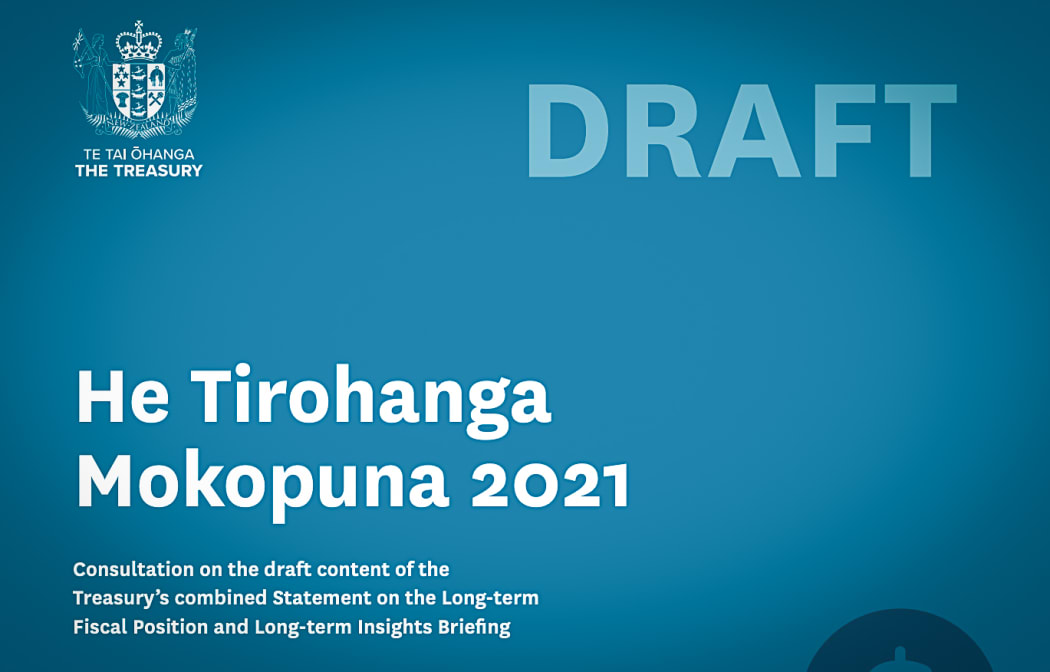How will decisions made about Covid-19, climate change, housing and an ageing population play out 40 years from now? The Treasury* has some thoughts and wants the public to weigh in.
*Treasury is an independent advisor to the Government on economic and financial policy.

Treasury's draft of its long-term fiscal statement is open for submissions Photo: Supplied / Treasury
Its thoughts on the next 40 years are collated in the form of a draft statement on the long-term fiscal position of New Zealand called He Tirohanga Mokopuna 2021. Anyone can make a submission until July 30.
The word ‘fiscal’ can be off-putting but it’s just an economic term used to describe Government revenue collection (e.g. taxes), expenditure, assets, and liabilities, or put very simply, how the Government manages money-in and money-out.
Fiscal policy affects everyone in a variety of ways like how the Government spends money on plans to address climate change, whether to increase the retirement age or if tax increases are needed.
But in its first round of submissions on the statement’s topics, only five submissions were made to Treasury.
In this version, there are a bunch of scenarios that explore what could happen if a Government responded in a certain way to potential issues.
It has a fair amount of economic language in it but submitters don’t need to have a thorough understanding of the report and can focus on a particular subject area which is listed in its contents e.g cost of health care, taxes, climate change, and an ageing population.
For example, what would happen if a government did nothing? (See page 20 of statement for this one) Or what can a government do now to make sure the country is prepared for the effects of climate change, like an increased risk of floods or droughts? Should it increase funding for climate research or make regulations that discourage building on risky land?

Young people lead the charge at a strike for climate rally held at Parliament Photo: ©VNP / Phil Smith
Feedback from submitters will shape the report which will be in the minds of those who develop government policy.
Forty years may seem like too far away to think about for many people but Treasury Deputy Secretary Bryan Chapple said young people’s voices are critical.
“Young people are going to be affected by decisions that Governments make over the next 20 or 30 years and so we’re very keen to hear from young people about how they want Governments to make those decisions.”
“They’re the ones for whom some of the impacts will be felt.”
Chapple said it’s about policy for all New Zealanders, not just economists or fiscal policy enthusiasts although Treasury wants to hear those views as well.
Being succinct and clear is helpful when writing a submission said Chapple and it can be as personal as someone’s own experience of trying to buy a house.
“If they can tie it back to what that means for the kinds of Government policy areas that we’re looking at, that will help us.”
Why does Treasury do this?

Treasury Deputy Secretary Bryan Chapple Photo: Supplied / Treasury
Every four years Treasury is required to produce a statement on the long term fiscal position of New Zealand that looks at least 40 years ahead.
A new Public Service Act also requires Government departments to produce an insights briefing and Treasury has combined its one into the draft statement.
“It’s to be done independent of Ministers and to contain information that looks at those trends and provides some potential policy options,” said Chapple.
It doesn’t make policy recommendations (that’s for MPs to do), but it does provide some options and analysis and also puts it out to the public.
This combo means Treasury can analyse key trends (e.g. an ageing population) and their potential long-term fiscal impacts (e.g. the increased cost of superannuation) directly alongside a range of policy options available to address them (e.g. increase the retirement age so those pension payments start later).
It’s also a requirement that a two-phase public consultation takes place and the first one on the topics for the statement was opened for submissions earlier this year in March.
Treasury received five submissions and consulted with eight experts.
Chapple said the number of submissions was less than they’d hoped for but they were useful and sparked interesting conversations like thinking long term about the purpose of the tax system.

Photo: VNP / Daniela Maoate-Cox
“How much is it just about raising revenue versus changing people’s behaviour?” he said.
“What economists sometimes call ‘corrective taxes’ for example to encourage certain types of environmental behaviour, so petrol taxes might be an example of that.”
The second phase of consultation is what Treasury is calling for submissions on now and it includes analysis on the impact of different types of tax changes.
“One option if you’re worried about debt increasing is to reduce spending. Another option is to increase taxation and there are different ways in which Governments could do that.”
Chapple said Treasury would like to know if people think it has captured the relevant impacts on different types of taxation changes, if there are others it hasn’t thought about, or if there are different information sources that would give it new insights.
“We’re keen to get as many submissions as we can from people telling us what they think about it,” he said.
“Particularly if people have got information or data that would help in doing the analysis, we would be really grateful for that.”
“There will be a limit of course, as to how much we can pick up in our final report but all that information will be useful as we go about doing our policy analysis.”
What happens next?

The table in the middle of the debating chamber where documents are put for all MPs to read Photo: VNP / Daniela Maoate-Cox
The final report will be handed over to the Minister of Finance in September and tabled in Parliament which means it’s put somewhere all the MPs can read it (sometimes literally on the table in the middle of the debating chamber).
All the insights briefings will be referred to select committees and so this report will too.
Committees are in charge of deciding whether they ask for public feedback on anything they’re examining.
“Even if select committees don’t formally call for submissions parliamentarians will have no doubt heard comments from constituents or in the media that's analysing some of the information in them and so will no doubt draw on that in their questioning anyway,” said Chapple.
Things to think about:
1: People are living longer

Pacific people have lower life expectancies are will be impacted by changes to superannuation eligibility Photo: VNP / Daniela Maoate-Cox
The life expectancy of New Zealanders has increased but is also varied for different groups so while increasing the age of eligibility for superannuation might help the Government’s accounts, there is potential impact on Māori and Pacific peoples who have lower life expectancies relative to the rest of the population.
The draft statement He Tirohanga Mokopuna 2021 says “people with shorter life expectancies will receive less over their lifetimes, even though they may earlier have paid broadly similar net taxes and contributed to their elders’ pensions” and the gap between these ethnic groups isn’t likely to close in the next few decades.
Higher house prices mean the idea that most people will retire and own their home when they reach retirement age is also up for debate.
“There’s a question about whether that will hold in the future and so what does that mean in terms of superannuation policy?” said Chapple.
In the past Treasury has suggested options like increasing the eligibility age for superannuation.
“Well, do those factors mean you’re more cautious about doing that?” Chapple said.
2. Healthcare costs are likely to increase

Photo: 123rf
Health and superannuation are big drivers of government expenditure and likely to increase in the future so Treasury has analysed these areas more closely.
Chapple said feedback on this analysis is welcome.
“‘Are there other things that we should have analysed? Are there other ways of thinking about those two issues that we haven’t thought about and particularly if people have got information or data that would help in doing the analysis, we would be really grateful for that.
“There will be a limit of course, as to how much we can pick up in our final report but all that information will be useful as we go about doing our policy analysis.
“Different types of tax changes: reduce spending is one option, or increase taxation and there are different ways governments can do that.”
3. Climate change risks

Sea-level around New Zealand has risen by 20 centimetres in the past century, and is forecast to continue to rise. Photo: Dave Allen / NIWA
Climate change will impact wellbeing, increase natural disaster events and add economic and fiscal costs on top of the costs of temperature and sea-level changes, says He Tirohanga Mokopuna 2021.
It also says “the fiscal costs of transitioning to a low-carbon economy are not yet fully known, and depend on the speed of emissions reduction and the tools used” and Governments will have to compromise including “between fiscal and economic impacts of the emissions trading scheme, and the cost of domestic action versus entering the international emissions credit market.”
Some of the types of changes will have long-lasting impacts, said Chapple.
“Think about climate change which is something we’ve started to analyse in this statement for the first time. That is going to be a change over a number of years, over a generation or two I guess and the decisions taken by Governments will have a long-lasting impact. So you do need to look over a sufficiently long period to do that.
“That said, none of us here at the Treasury would pretend that the sorts of scenarios we’re presenting in this draft document are how things are actually going to turn out.”


